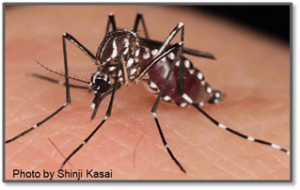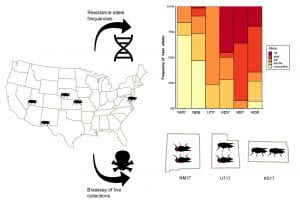Resistance to mosquitoes: BBC interview
Congratulations Dr. Juan Silva!
Congratulations Dr. Cera Fisher!
Genome Of The Widely Used Rockefeller Strain Of The Yellow Fever Mosquito Sequenced
Jeff Scott Recognized for His Work on Insecticide Resistance and Insect Toxicology
ACS INTERNATIONAL AWARD FOR RESEARCH IN AGROCHEMICALS Sponsored by Corteva Agriscience
“Lessons learned from decades of investigations into insecticide toxicology”
Congratulations Cera
Congratulations to Jamie Freeman (MS ’20)
She received the ESA Fitch Award from the Eastern Branch of the Entomological Society of America for her outstanding research, teaching and service during her MS. Jamie’s research focused on identification of the mutations responsible for the extremely high levels of pyrethroid resistance observed in a population of house flies collected from Kansas. Her research has resulted in three publications and one more paper that is in preparation. We wish Jamie continued scientific successes in the next phases of her career!
Conservation of the Sodium Channel between Different Insects is Explored
The voltage-sensitive sodium channel (VSSC) is essential for the generation and propagation of action potentials. The VSSC can change sodium kinetics by producing different splice variants (optional and mutually exclusive exons). The VSSC is the target site of pyrethroid insecticides as well as DDT and oxadiazines, which are used for control of crop pests and vectors of human diseases. Unfortunately, knockdown resistance (kdr) mutations in Vssc confer resistance to these insecticides. Recently, Silva and Scott 2019 investigated the conservation of VSSC by three approaches: (1) across insect Orders, (2) codon constraints of kdr mutations between populations of Aedes aegypti and (3) within a population of Drosophila melanogaster. Overall, VSSC is highly conserved across insects and within a population of an insect but important differences do exist. Read more: https://doi.org/10.1111/imb.12605
Insecticide resistance monitoring of House flies
House flies have evolved resistance to most insecticides, and as insecticide use continues over seasons it is expected that levels of resistance will rise. Freeman et al. recently investigated (https://www.sciencedirect.com/science/article/pii/S0048357519301282?via%3Dihub) flies collected from livestock facilities in five states to check levels of resistance against three commonly used insecticides. A population collected from Kansas had previously unseen high levels of resistance to permethrin, a pyrethroid insecticide, that could mean this type of insecticide will be of limited use for house fly control in the United States in the near future.
Insecticide resistance in Drosophila melanogaster and sour rot
 Control of sour rot in grapes is commonly achieved using insecticide to control D. melanogaster. 2018 was one of the worst years for sour rot in grapes in New York in decades. Sun et al. report that the outbreak of sour rot at one NY vineyard was associated with an inability to control D. melanogaster due to the evolution of resistance. https://doi.org/10.1093/jee/toz039
Control of sour rot in grapes is commonly achieved using insecticide to control D. melanogaster. 2018 was one of the worst years for sour rot in grapes in New York in decades. Sun et al. report that the outbreak of sour rot at one NY vineyard was associated with an inability to control D. melanogaster due to the evolution of resistance. https://doi.org/10.1093/jee/toz039







